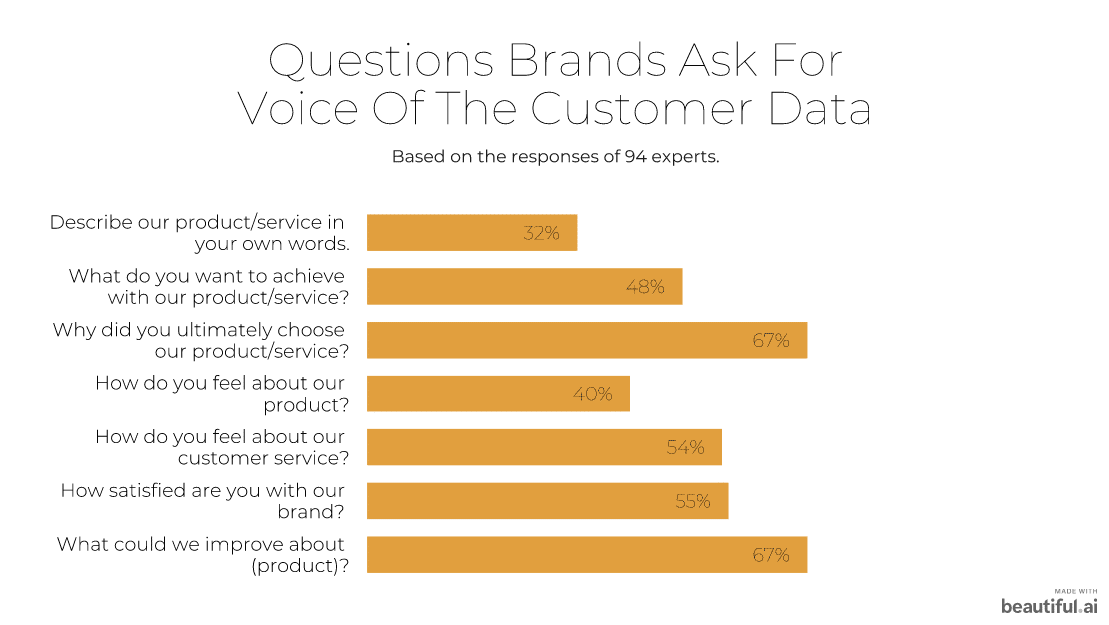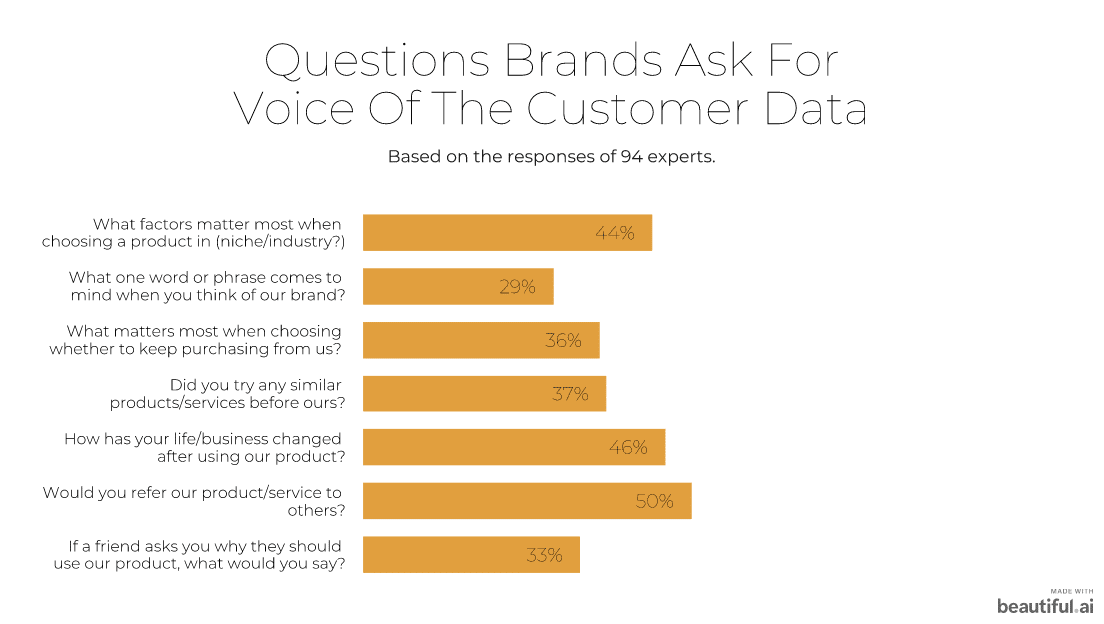Interviewing or surveying customers is a great way to learn what truly matters to them and their thoughts on your product/service. The data gathered in this process is known as voice of the customer data.
But there’s only one way to ensure you can get the most valuable nuggets from this voice of the customer data: Asking the right questions. If you don’t pay attention to what you ask, you not only waste your customer’s time, but also yours.
So what questions should you be asking? We polled 94 experts to answer this question, and why certain questions are most helpful to ask. Our findings are all packed in this post. Dive in.
Questions to ask to generate voice of the customer data
Before we get into the details, let’s give you an overview of the questions 94 respondents who contributed to this piece are asking.
Altogether, we’ve gathered data on 14 questions. You can see that the most frequently asked questions are: “Why did you ultimately choose our product/service?” and “What could we improve about our product?”
With 67% of contributors asking each of these questions, it seems the majority is curious to learn exactly why their customers are choosing to buy from their brand, as well as how they can improve their business further.
“How satisfied are you with our brand?” is the second most popular question that 55% of the experts ask. Following closely is the question, “How do you feel about our customer service?” asked by 54% of experts.
- 50% also want to know if their customers would recommend their product/service, asking “Would you refer our product/service to others?” This is very similar to the standard question used to open an NPS survey.
- 48% ask “What do you want to achieve with our product/service?
- 46% question “How has your life/business changed after using our product?”
- 44% inquire about “What factors most when choosing a product in a niche/industry?”
That said, the least popular questions in this list were: “If a friend asks you why they should use our product, what would you say?”(33%), “Describe our product/service in your own words.” (32%) and, “What one word or phrase comes to mind when you think of our brand?”(29% ask this).
Let’s dive into the details now as we tackle questions on:
1. Choosing your product/service
First things first. Satiate your curiosity on why customers choose you over your competitors. It’s an essential question to ask so you can optimize product features or other aspects that are driving the bulk of your customers to buy from you.
To this end, here are three versions of the question to ask:
- “Why did you ultimately choose our product/service?” – Ouriel Lemmel, WinIt.
- “What were you feeling frustrated with when you started seeking a solution to your problem?” – Jeannette Castaneda, Inbox P.I.
- “What do you want to achieve by using our service?” – Ann Young, Fix The Photo.
“This question really helps us understand the type of customer interested in using our service,” Young shares their experience. “When replied in their own words, we can get a grasp of their likes, dislikes, intentions, desires, and overall voice. With these results, we are able to align our marketing strategies with our customer voice, generating and converting more leads.”
Adding to the benefit of this question, Lemmel points out, “a primary goal should be to not only provide customers with solutions to their problems, but to also stand out among similar companies trying to do the same.”
Therefore, “inquiring about what other options customers tried and why they ultimately chose yours helps you learn about what exactly they value about your brand specifically, which is excellent information to know in order to continue separating yourself from competitors.”
A pro tip here: “Similar to this question, you can also ask customers what it was about previous options they tried that didn’t work for them, which made them move on to other options,” Lemmel adds. “This way, you can not only understand what to continue implementing in your own business that’s working, but also what not to implement.”
Remember: As Castaneda shares, asking this question is important because “that is the point when they began their buyer’s journey [what they were feeling frustrated about] and the point at which we want to reach them.”
2. Describing your product/service
Another good question to ask is: “Describe our product/service in your own words,” according to Caravan Digital’s Chris Ostergaard.
Asking this question is critical for learning how your audience describes your product so you can use the same terms and language to write your website and landing page copy. Often, it’s hard to describe your work or product on your own – you might even end up slipping in jargon or a technical word or two.
Knowing the answer to this question helps you avoid this. Ostergaard echoes the same.
“This question will allow you to create a database of the terms and words used to describe your brand through which you’ll be able to determine language patterns. Those language patterns will be very important when you begin drafting copy and start A/B testing.”
3. Recommend your product/service
Word of mouth and customer referrals are crucial for any business’s growth. Asking a question about this can help you understand how likely your customers are to recommend you.
Not only does this help with your marketing, but it also gives you an idea of how satisfied your customers are. After all, only those who are truly content with a service recommend it to others.
So here’s what you should be asking: “Would you recommend our product/service to others? Why or why not?” in the words of Gabriel Dungan from ViscoSoft.
“This puts the ball in the customer’s court, giving them a chance to tell us what is important to them,” Dungan explains. “It also provides them with the opportunity to have the last word, which I think makes it clear we are truly interested in what they have to say.”
John Berry from Berry Law adds, “If we cannot foster loyalty, there will inevitably be a decline in growth and ultimately lack of success in the long term.” In short, “word of mouth is still crucial in law” (and all industries!), and asking this question will help you understand how well you’re doing in that department.
4. Search terms to find business
SIGNAL+POWER’s Michael Anderson shares another important question to ask: “What search terms did you use to find our products?”
Guess what this helps you understand? The keywords you should be using to optimize your website, even blog content.
“A lot of online businesses may not fully realize the diversity of terms that people use to search for the exact same product,” Anderson observes. “With this in mind, I think it’s important for these businesses to gather as much data as possible as to the exact text customers entered into any given search engine that lead them to your products.
If a business has enough of this information, they can use it to optimize both SEO and paid search campaigns.” Hence, getting valuable marketing raw material.
5. Topics to cover in content
Again, this question is geared toward understanding your target audience better so you can market your product/service better.
Sander Tamm of E-Student shares the question you should be asking in this regard: “Do you have any suggestions or topics that you want us to cover?”
“This is helpful because, first, you are positioning the customer as an ally and a source,” continues Tamm. “This empowers them to contribute and collaborate. Next, this gives you an insight on what they want to see/have.”
In fact, one of the best ways to find ideas for fresh content is to talk to your readers. This question helps you with that.
6. Your customer service
Customers are ever-willing to pay more for great customer service. In fact, 7 out of 10 US consumers share they’ve spent more working with a business that delivers great customer service.
The takeaway? You can’t afford to not learn how your customers are evaluating your customer service. Dixa’s Mikkel Andreassen suggests you ask, “How do you feel about our customer service?”
“This is the most helpful question because it indicates how we are being perceived by our customers,” Andreassen shares. “The voice of the customer is essentially that, describing their customer journey from start to finish and what they thought about their experience. When you allow the customer to fully express themselves through Live Chat, it makes the collecting of VoC data a much more personalized experience, empowering the customer and boosting your CX.”
52% of Millennials prefer live chat over other communication channels—and as the biggest generation in US history, live chat is fast becoming a must.
7. How your product/service has helped customers
This is another essential question for getting a complete picture from the voice of the customer data. Here’s one way to phrase it, according to Golda Criddle from ReviewInc: “What value does our software provide that makes you keep subscribing?”
“With this simple question, we can pinpoint what we are doing right to keep providing that value in the future,” notes Criddle.
LTHR Shaving’s Timmy Yanchun outlines more ways to ask the same question to prod your customer: “Consider asking:
- How [has your] business changed after [your] purchase? (For B2Bs)
- How are [you] using our product?
- How much time is it saving you?
- What are some of [your] favorite features?”
8. On feedback
There are tons of questions you can ask to get your customers’ feedback and understand exactly what it is that you can improve and optimize. The plan? Be able to create a list of ‘what to do’ and ‘what not to do’ with the answers you get.
The feedback you’ll get here is “such a helpful insight to know because as a business, you always want to be focused and committed to improvements, and without knowing what customers are unsatisfied or concerned with, it’s hard to make those improvements,” Mike Nemeroff from RushOrderTees shares. “Plus, when you conduct surveys with many different customers, you’re able to discover trends and see where large-scale changes need to be made.”
So let’s start with the basics: “Can our product/service be improved?” according to Devin Johnson from Kennected. “If you ask the customer first if the service can be improved, then ask them how it can be improved, you are going to get a detailed and thoughtful response.”
Finding Balance’s Lily Ugbaja shares such a question precisely. “What could we improve about our product?” So you can start with asking ‘can it be improved’ then jump into the specifics of ‘how it can be improved.’
Keep in mind that asking this question not only gives you meaningful answers, but it also makes your customers feel “a sense of importance and being valuable (which they are),” Ugbaja notes. “It shows that you care about them, their opinions and their needs. It is also an opportunity for them to tell you what competitors are doing that you are not doing. Call it free market niche research.”
Once you’ve got your answer, you can go on to get a broader picture of how customers think you can improve your service. It’s why Harriet Chan from CocoFinder suggests you ask: “What can we do to serve your needs better?” The answer will help you dig deep into “customer needs, challenges, and goals because the road to growth and innovation is paved with customer feedback.”
So let’s suppose your product is good, but customer service or onboarding or support resources need work, your customer can point that to you in their answer to this question.
Essentially, asking how to improve your product/service is “a homerun customer survey question” as EasyMerchant’s Stacey Kane highlights. “It allows the company to get in front of a bad review and ameliorate the root causes of problems before they escalate, instead of simply managing and dealing with the irate complaint voice of a customer.”
You can also go on to ask an open-ended question. Nikola Roza from SEO for the Poor and Determined shares, “How could we do better?” as one possibility. “It’s an open-ended question because it’s not clear in regards to what area you’re asking. But, that’s on purpose because it’s up to them to tell you what’s wrong, and every person will say something different. Your goal then is to organize their responses and find commonalities which will be areas where you as a brand are weakest.”
9. Negative questions
Lastly, it’s also important you get your customer to talk with negative questions, like the ones that AJ Brown from LeadsRX shares. “After building initial trust, negative questions help to get to the ‘meaty part.’
- “What held you back from completing the purchase?
- Were there items you couldn’t find?
- Was there any information you couldn’t find easily?”
How does asking these questions help? Brown thinks asking these open-ended questions helps you gather general feedback that “can shed light into any area you haven’t covered before.” What’s more, “the negative questions set the stage for a more open conversation, providing the interviewee a chance to open up,” Brown observes.
Ready to ask the right questions for gathering the voice of the customer data?
With these nine types of questions, we’re sure you’re feeling ready to survey or talk to your customers. We’re also sure these questions will help you gather a boatload of valuable feedback that’ll be actionable enough to narrate the next steps you need to take your business to the next level.






